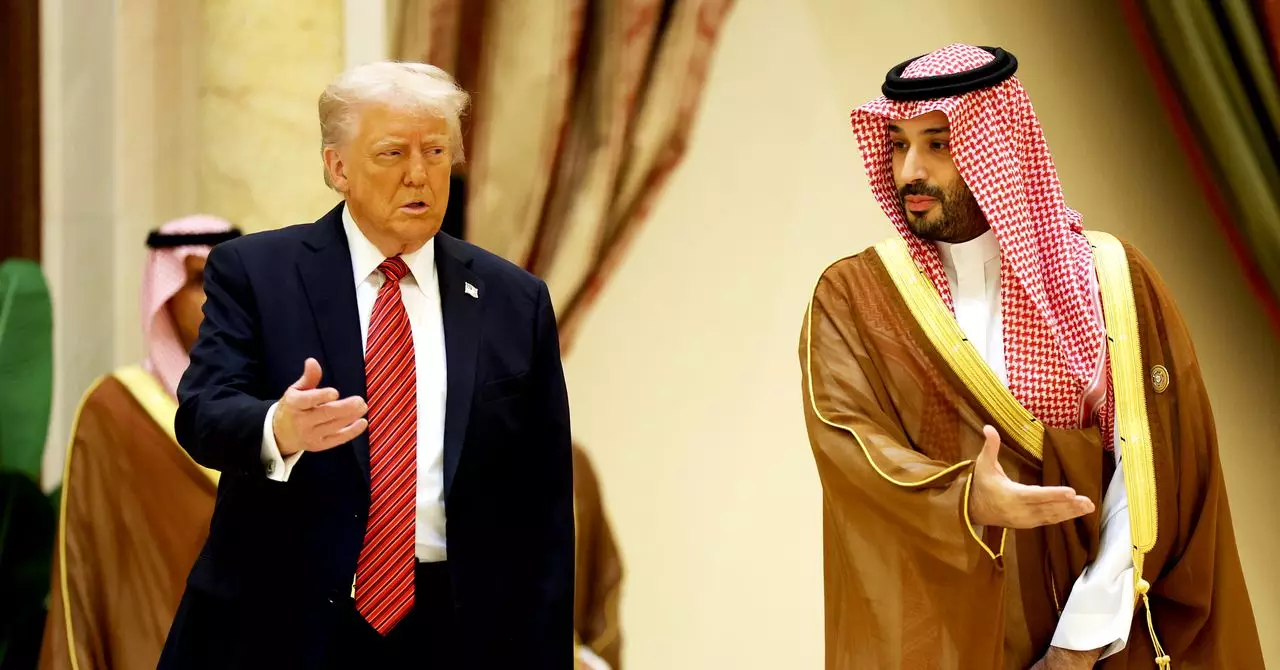Donald Trump’s recent expedition to the Middle East, framed as an effort to solidify American technological dominance, was replete with ostentation and ambition. Accompanied by a cadre of wealthy tech moguls and shielded by a fighter jet convoy, the visit was not just about meeting state leaders; it was a calculated maneuver to foster transformative business collaborations that could redefine the landscape of artificial intelligence (AI) globally. The finale of this diplomatic roadshow unfolded in the glittering city of Abu Dhabi, where Trump made a landmark announcement: significant American companies would ally with the United Arab Emirates (UAE) to establish the largest AI datacenter cluster outside American soil.
This move is emblematic of a broader trend—nations across the globe are increasingly viewing cutting-edge AI technology as vital to national security and economic prosperity. Trump, during his address, stated that the collaboration would involve American firms aiding G42, an Emirati enterprise, to erect a formidable 5 gigawatts of AI computing capacity in the UAE. This partnership could not only elevate the UAE’s status as a technological beacon but could also position it as a pivotal arena for innovative research and sustainable technological development.
The Playground of Power: Saudi Arabia’s AI Ambitions
Trump’s Middle Eastern jaunt actually began a few days earlier in Saudi Arabia, where the kingdom unveiled its own ambitious AI project—Humain, an investment firm fully backed by the state’s Public Investment Fund. This initiative has already struck monumental agreements with major tech powerhouses like Nvidia and AMD, which resonates powerfully in the geopolitical theme of tech rivalry. Given that the infrastructure being built is set to train and empower sophisticated AI models, these developments underscore a monumental shift in how nations perceive and maneuver through technological rivalries.
During his Riyadh visit, Trump confidently forecasted deals worth billions, framing the burgeoning partnership as essential for both American industrial goals and for enhancing the Saudi and UAE positions in AI-focused industries. With an eye towards fostering an ecosystem that supplies essential AI infrastructure, these agreements signal a defining moment that may enable Saudi Arabia and the UAE to transform into significant players in the ongoing global race for technological supremacy.
The Demand for Advanced Technology: Saudi Arabia’s Steps Forward
The significance of Saudi Arabia’s alliances with tech giants cannot be understated. With Nvidia at the fulcrum, the kingdom’s collaboration is set to generate a staggering 500 megawatts of AI computing capacity, anticipated to roll out as several hundred thousand advanced GPUs are delivered over the next five years. These chips promise to enhance training and inference capabilities exponentially—up to four times better for training exercises and an astonishing thirty-fold improvement for model inference compared to competitive offerings.
Such advancements would empower Saudi Arabia to craft frontier AI models, aligning with its goals to diversify its economy away from oil dependency. Meanwhile, AWS and Humain are also laying the groundwork for massive infrastructure investments in AI, illustrating the growing commitment of these nations to technological advancement. An investment tally exceeding $15 billion in AI infrastructure further underscores a regional drive towards embracing a tech-centric model of economic development.
The Complications of Global Geopolitics
However, this drive toward AI enhancement does not come without its complications. Both the UAE and Saudi Arabia find themselves straddling a fine line in the complex web of geopolitical relationships, particularly with China, which has been increasingly prolific in its technology sales to the region. That context adds layers of complexity and raises critical questions about the long-term trajectory of Middle Eastern AI ambition amidst escalating global tensions between superpowers.
Notably, just before Trump’s visit, his administration made a significant policy shift by reversing a Biden-era ruling that aimed to restrict the sale of advanced chips. This legislation had established tiers for nations regarding access to such technology, potentially cutting off vital resources from the UAE and Saudi Arabia. Critics at the time warned that such constraints could push these nations to seek technological partnerships elsewhere, particularly with China. By dismantling the restrictions, the Trump administration not only advocates for American industrial growth but also stokes the fires of a fierce global competition in the AI sphere, illuminating the high stakes involved in the technology race.
The metamorphosis of nations like Saudi Arabia and the UAE into formidable tech players may well serve as a blueprint for others upending traditional notions of development. The ongoing investments signify a paradigm shift—a regional realization that embracing technology can lead to sustainable growth amidst uncertainty. In navigating these complexities, these nations are not merely adapting; they are positioning themselves at the forefront of an inevitable technological renaissance. The outcome remains uncertain, yet the movement toward AI as a critical focal point of diplomacy suggests we are witnessing a transformative chapter in global discourse on technology and power.


Leave a Reply